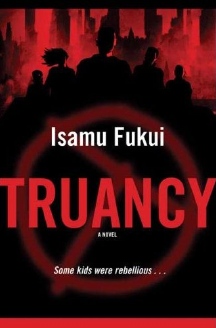Teenage novelist
Isamu Fukui pulls no punches in his first novel, 'Truancy'. From the
get-go everything is in your face and tough to ignore. We're plunged
into the world of the City, where the Mayor is giving one Mr. Caine
a dressing-down. An armed revolt against the schools that calls itself
the Truancy has attacked again, and the Mayor is disinclined to accept
any more excuses for Caine's failure to corral them. Students are to
be numbered, branded and controlled. End-of-story – if it weren't
just the beginning.
'Truancy' is a blunt-edged fable, a take on the US educational system
so severe that "Orwellian" is just a decent way to begin your
description. But there's a muscular glee in this bare-fisted free-for-all,
an eye-poking delight that brushes past subtlety and wrestles it to
the ground. Fukui takes a simple hero's journey and doesn't make the
mistake of over-complicating matters. There is the City, the System
and the students. Ready, s– GO!
As befits a fable, the plot is pretty simple. Tack is a fifteen year-old
kid who is trying to stay out of trouble, but in Fukui's diabolically
designed world, that's damn near impossible. The school he attends is
run almost like a prison, with one educational goal in mind; blind,
mindless obedience to the powers that run the school and the city. One
afternoon, being pursued by bullies, Tack jumps over a barrier and escapes
into District 19, the one deserted part of town. There he finds an incongruous
scene: amidst the rubble-strewn streets, a lemonade stand, manned by
a kid not much older than he, a kid who should by all rights be in school.
The teenager calls himself Umasi and dispenses wisdom as well as lemonade.
Meanwhile, Zyiud, the leader of the Truancy is plotting even greater
violence and mayhem. It's only a matter of time before Tack finds himself
called out to make a decision that will change his life and the lives
of those round him.
Fukui's world is stark, drawn in simple lines but done elegantly enough
to seem more like a fable than an errant schoolboy's rant. There are
no science-fiction inventions here beyond the invention of the world
itself, which is a boiled-down reduction of the worst our world has
to offer. Though he never names the City, I was inclined to see something
New Yorkish. Tack has a little sister named Suzie and parents who barely
show up long enough to make the little indistinct trumpet sounds that
we used to hear in the Peanuts cartoons. Everything is brutally circumscribed
by a system that's designed to crush creativity and any impulse that
might lead one to Question Authority. There's a sort of YA Kafka-esque
feel to 'Truancy,' a touch of the absurd that keeps the built-in polemic
nature of the work from becoming tiresome or overbearing.
Characters are built from big sturdy blocks that fit together well.
Tack starts out as a harried nothing, the sort of kid that nobody notices.
But as he's drawn into the world of Umasi and the Truancy, he grows
in a manner both predictable and enjoyable. He learns to question and
fight; he becomes a force to be reckoned with. His sister, Suzie, is
charmingly but not cloyingly sweet. Umasi plays the Obi-Wan Kenobi role
and is over-written just well enough to keep us liking him. The Mayor,
Caine and a series of luckless lackeys are froth-mouthed monsters, but
real enough to make readers cheer every time a new scheme is frustrated
by the freedom fighters who call themselves The Truancy. And as for
the Truancy, Zyid and his compadrés are violent and ruthless
enough to be just as disturbing as their autocratic opponents.
Fukui uses the same combination of simplicity and power in his plotting
and his prose. 'Truancy' may go where you expect it to, but it does
so with a lot more violence than you actually hope, and that's good.
The body count is high enough to be disturbing, especially in a climate
of school violence. The writing isn’t elegant, but it's smooth
and sinewy when it needs to be. If you’re going to punch somebody
out, elegance can be counterproductive.
'Truancy' is a novel that has a sort of retro feel to it. It's simple
and straightforward, eschewing fantasy or the fantastic in every way
other than the setup and the setting. In some ways, it's reminiscent
of an episode of The Twilight Zone. Fukui manages to walk a pretty fine
line; we have to believe in the reality of the world he describes, and
we do; but the elements of fable and the absurd also have to be observed.
It's certainly relevant on a number of levels. Fukui speaks to the rigidity
of education as we know it by putting a fist to its face. But the unconscious
elements of school violence, the surfacing of male power fantasies,
and the sweetness underlying the relationship between brother and sister
keep that first fist from battering the reader into a rebellion against
the writer. Isamu Fukui is an articulate teenager and an adept writer
whose first novel, 'Truancy', is entertaining. It's also educational,
effectively using many of the same methods it depicts with such graphically
violent glee. Fukui ignores every trend he may have been exposed to
and shouts out what he wants to say. Readers on the receiving end of
Fukui's rant might be quite surprised to find out just how enjoyable
it is to have this smart teenager yelling at them.
